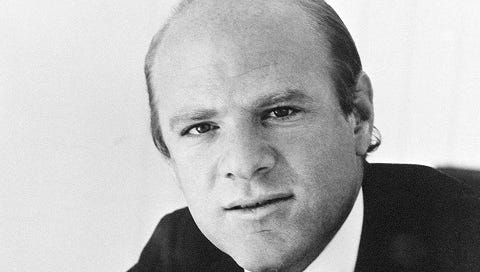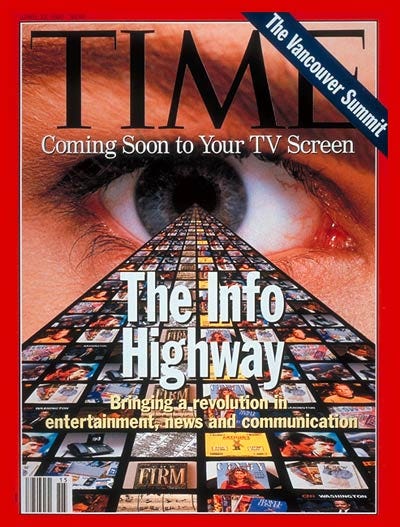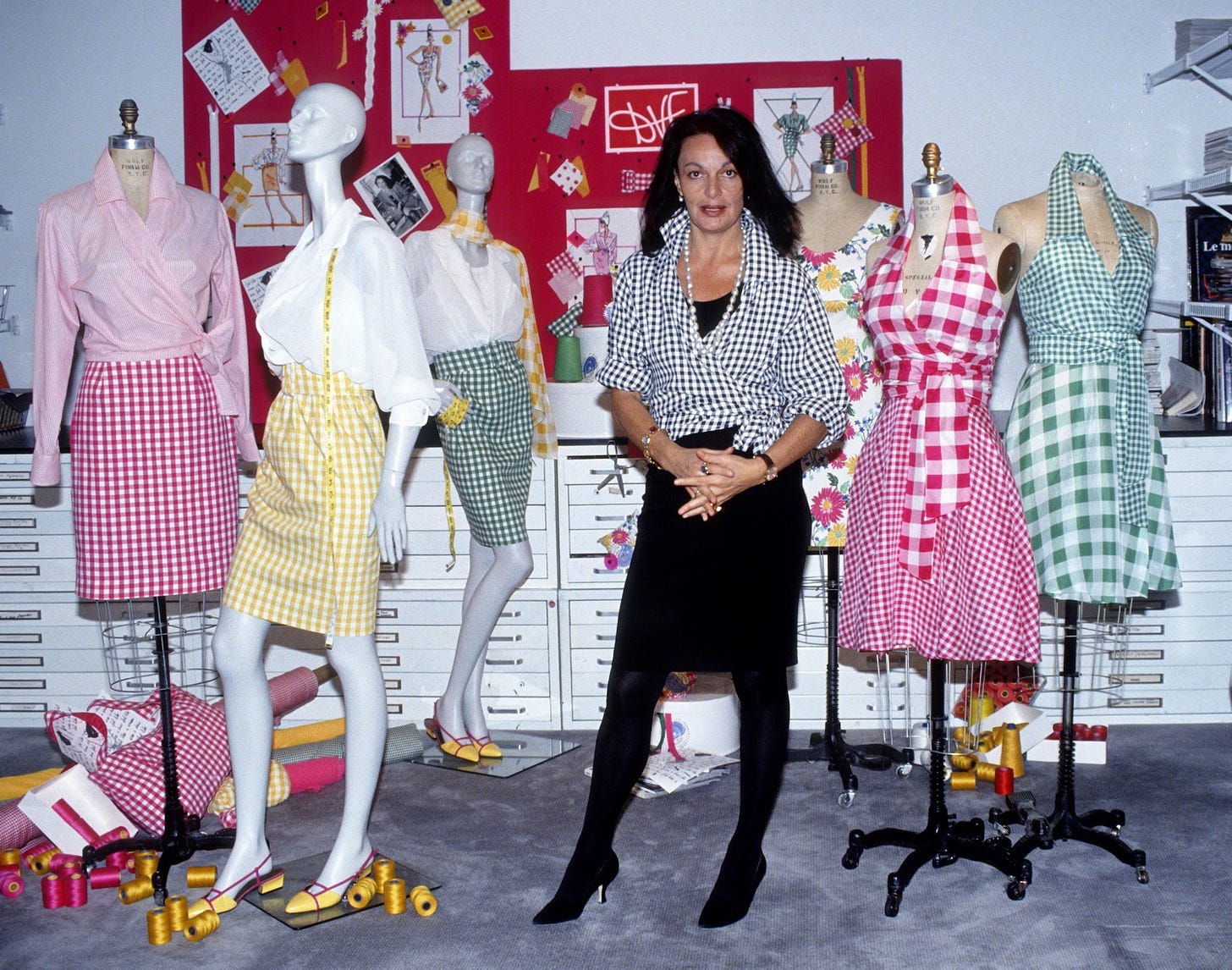Barry Diller's Beginner's Mind
It takes courage to become an un-learning machine
“The human mind is a lot like the human egg, and the human egg has a shut-off device. When one sperm gets in, it shuts down so the next one can’t get in. The human mind has a big tendency of the same sort.” Charlie Munger
It’s hard to change your mind. We get emotionally attached to ideas. They become part of our identity, especially if they made us successful. Planck said “science progresses one funeral at a time.” Investing may be more art than science but its ideas have the same risk of emotional attachment. Buffett: “you buy shares of General Motors. Now all of a sudden you have this feeling about General Motors. You got all these feelings - the stock doesn’t know you own it.”
And yet we’re supposed to be “learning machines” to compete in what Yen Liow called the “most extreme version of competitive learning.”
A well-known example is Buffett’s evolution from “Graham to Fisher,” from a focus on valuation to a focus on business quality and reinvestment runway. The transformation didn’t happen out of the blue, it took a sustained effort by Charlie Munger to change Buffett’s mind.
So the sequence of learning matters. What you learn first can create resistance to later ideas. Perhaps at one point it was a good idea for novice investors to start by reading Security Analysis. Today I’m not so sure (I’ve never entirely read it so I’m probably biased).
Whatever the sequence of your learning journey has been been, the challenge is to retain an open mind, a beginner’s mind.
“People get stuck as they get older. Our minds are sort of electrochemical computers. Your thoughts construct patterns like scaffolding in your mind. You are really etching chemical patterns. In most cases, people get stuck in those patterns, just like grooves in a record, and they never get out of them. It’s rare that you see an artist in his 30s or 40s able to really contribute something amazing. Of course, there are some people who are innately curious, forever little kids in their awe of life, but they’re rare.” Steve Jobs, Playboy Magazine 1985
The burden of mastery
Achieving mastery is costly. It requires an investment of time and effort to gain knowledge, practice skills, absorb the lessons of mistakes, and build networks. The rewards can be financial success, social status, perhaps a sense of achievement and fulfilment.
The more energy we invest, the more attached we become to our path. Mastery feels good and becomes an important part of our identity. Finally we operate in known territory and can focus on exploiting rather than exploring.
It seems almost unreasonable to expect a true beginner’s mind from someone who has achieved mastery. It implies accepting that the accumulated domain expertise could be outdated, that existing networks could lose their relevance, that patterns stop working. It’s like writing off goodwill on the balance sheet: an acknowledgement that costly intellectual property lost value.
“Everybody wants to start where they are. Nobody wants to go back down the mountain to find a path to the top. Everybody wants to stay on the path they're on. The hard part is not the learning, it's the unlearning.It's not the climbing up the mountain, it's the going back down to the bottom of the mountain. It's the beginner's mind that every great artist or businessperson has. You have to be willing to start from scratch.” Naval
A friend of mine spent his career picking stocks. He recently started experimenting with commodity futures. Not because he wants to become a commodities trader. But because he is a learner and always experimenting, always looking for new ideas. And because, guided by some experienced teachers, he is working on a thesis that commodity markets will be more important in the coming decade and offer significant opportunities.
While he expects valuable insights for his stock picking work, one could argue that this effort is a distraction, a potentially costly boondoggle. “Stick to your knitting and your circle of competence!”
I would argue that it’s an example of Bezos’s philosophy to allow for experiments and failure: “To invent you have to experiment, and if you know in advance that it’s going to work, it’s not an experiment. Most large organizations embrace the idea of invention, but are not willing to suffer the string of failed experiments necessary to get there.” Bezos would view the loss of a small bet as an acceptable cost of learning and experimentation.
But what if my friend discovered he was better at trading commodities than equities? What if he was more successful using charts and sentiment than fundamental analysis? What if he spent decades becoming a value or growth investor, building his livelihood and identity around that idea – only to find out now that another path could be a better fit for him? This objectively valuable insight could cause tremendous discomfort. No wonder there is resistance to true exploration. Who wants to question the assumptions on which they’ve built their world?
Which is why I have a lot of respect for people who pivot late in life, who don’t let success and experience keep them from experimenting and reinventing themselves.
One of my favorite examples is Barry Diller’s descent from the pinnacle of Hollywood.
Barry Diller and the PowerBook
“Hollywood is now irrelevant.” Barry Diller, 2019
Hollywood may be irrelevant, but Barry Diller certainly isn’t. Which is surprising, given that his career dates back to the glory days of movies and TV. Unlike his peers however, Diller left the prestige of the old world behind to explore new territory.
Diller started at Hollywood’s William Morris agency in 1961 (where he read his way through the mail room). He was hired to work at ABC where he pioneered weekly made-for-TV movies. In his negotiations to buy product from the studios he impressed Charlie Bluhdorn, head of the Gulf & Western conglomerate which owned Paramount Pictures. Bluhdorn hired him to head Paramount in 1974, when Diller was only 32. After Bluhdorn’s death Diller left Paramount to head Fox for Rupert Murdoch. With the success of Fox’s fledgling fourth network, Diller was one of the most powerful men in Hollywood. But he wasn’t an owner.
Diller wanted control, he wanted to be his own boss. And so in 1992 he left Fox in a move that would confound his friends and peers.
“The course of my life has been curiosity and serendipity. I didn't have a single thought in my head other than, I don't know what this is, but I'm fascinated by it and I want to learn it.” Barry Diller
He bought an Apple PowerBook and was teaching himself how to use it. The device was a revelation to Diller who had started his career in the mailroom surrounded by filing cabinets. He realized that dramatic change was unfolding and that he needed to learn more.
“My odyssey began with the PowerBook. I learned it to leave Fox.” Barry Diller
“The PowerBook became for him a means of looking into the future.” Diane von Fürstenberg
Diller’s search for the new world led him on a road trip across the US (as profiled by Ken Auletta in the New Yorker). It wasn’t like when I joined two friends to drive from Nashville to New Orleans via Memphis to indulge in music, barbecue, and fried seafood. Diller had a private jet and an extensive network at the highest level. He visited leaders in media and technology such as John Malone, Bill Gates, Steve Jobs, and Brian Roberts.
Riding the Information Superhighway
This was before the internet became mainstream. Netscape’s browser launched in 1994 and the buzz of the day was still the “information superhighway,” a vision of a national information network (and popular talking point of the Clinton Gore campaign) providing consumers with on-demand entertainment, information, even shopping. It was centered around an interactive television with a smart cable box.
Here is Marc Andreessen describing the world before he launched his browser:
“My colleagues and I built Mosaic in 1992. It’s hard to overstate how contrarian a bet that was at the time. Believing in the whole idea of the Internet was pretty contrarian back then. At the time, the dominant metaphor was the information superhighway. People saw advantages to more information. At some point we got 500 TV channels instead of 3.
But much better than more TV was interactive TV came. That was supposed to be the next big thing. Dominant leaders in the media industry were completely bought in to ITV. Bill Gates, Larry Ellison—everybody thought interactive was the future. Big companies would (continue to) rule. Oracle would make the interactive TV software. The information superhighway, by contrast, would be passive. It wouldn’t be all that different from traditional old media. In 1992, Internet was quirky, obscure, and academic, just as it had been since 1968.”
Diller visited Steve Jobs who was building NeXT after having been booted out of Apple (he would rejoin Apple some five years later). Diller was impressed by the computer but didn’t shy away from criticism. He told Jobs he had made it “too hard. It's the most magical computer, it shouldn't be this hard.”
He visited Microsoft for lunch with Bill Gates who could clearly see a future of “information at your fingertips.” If the Information Superhighway was going to be the future, Microsoft would provide the operating system. Diller visited the company’s media lab and Microsoft’s VP for Multimedia and Consumer Systems remembered the meeting: “Of all the folks that have come by, Diller was the most engaged in the stuff we are doing.”
“Everything blew my mind. I knew little and each thing I saw made me think in ways I had not thought before.” Barry Diller
He also visited John Malone at TCI and Brian Roberts at Comcast. He found the cable tycoons more interested in the implications of technology than his peers in movies and television.
“Talk to the cable people, as opposed to senior people in the newsgathering business, or at the TV networks, or in the studios. Just line them up, and you find that people in the leadership of cable are students of technology and spend vast amounts of time and capital thinking issues through.” Barry Diller
From narrative to interactive
At this time his future wife Diane von Fürstenberg was preparing to sell a line of her clothing on a young cable shopping channel called QVC. Diller visited QVC several times, including once when von Fürstenberg was live and sold $2 million worth of items in two hours. Diller was blown away:
“I had only known screens for narrative storytelling purposes. Here I saw a screen being used at this primitive convergence of telephones, televisions and computers.”
“I watched a little screen and when there were a lot of phone calls, a lot of transactions taking place, the bars would rise, and then they would recede. It was like waves. It was a kind of wild experience. I thought, this is going to change things. I did not know how or where or why, but I knew that interactivity at scale, which was what I was watching, was going to be powerful.”
“It was the closest link I've ever seen between action and reaction.”
TCI and Comcast controlled QVC and Diller struck a deal to join the company and take a stake. This was a move few of his peers understood. It was a small company and “selling cubic zirconia” paled in comparison to making movies and running networks.
“All they care about is status. That's why they can't understand why I'm doing this. They say 'It's not very glamorous.’”
David Geffen, who had started with Diller in the mailroom at William Morris, said:
“Barry’s had one of the most unusual careers of anybody in America. When he decided he was going to take over QVC I was shocked. I didn’t think that was good enough, or big enough, or important enough, or classy enough for Barry.”
To be sure, the path from QVC to today’s IAC was not straightforward. At QVC Diller bid to acquire his old employer Paramount. But he lost the deal to Sumner Redstone and left QVC in 1995. He then joined Silver King Broadcasting, a small collection of stations with a stake in QVC’s rival, the Home Shopping Network.
Following his insight about “interactivity at scale” he started to invest in a string of businesses that were bringing transactions online, starting with sectors like travel, ticketing, and dating.

In 2003 he talked about the opportunistic nature of his pivot:
“Interactivity, the Internet, allowed scale and leverage. The next thing that came up was Ticketmaster, which had scale and leverage properties that I recognized. I made a relationship between the two in my mind, and then we acquired. But all of it was opportunistic. None of it was strategic.”
In the same opportunistic manner, IAC took a $1 billion stake in casino operator MGM in August 2020. In the Q2 shareholder letter and during the earnings call IAC CEO Joey Levin explained:
“Our history in driving off-line to on-line conversion gives us confidence in the path and, like other industries we’ve seen transform, a conviction that it will be assisted by natural tailwinds.”
“What do we bring to the table that they don't already have? The answer is, we don't know. When we entered travel, we didn't bring anything to the table in travel. When we entered home services, we didn't bring anything to the table in home services. When we entered dating, we didn't bring anything to the table in dating.
What do we think the future looks like. And I talked about that in the opener a little bit, this 10% penetration going to be the case 10 years from now. And our answer with high confidence is no, it will be meaningfully higher than that. And when we get into it, we'll learn more and we'll figure out where we can help.”
A friend of mine commented that Diller, despite his premier rolodex and being early to the internet, “missed” some of today’s most valuable internet assets.
It’s important to note that Diller’s pivot took time. For years he was investing in both internet and “old media” companies, acquiring and selling USA Networks. And his focus was on “real businesses” that were bringing transactions online. While he may have missed out on opportunities, IAC also didn’t blow up in the dotcom bubble (though he nearly bought Google competitor Lycos).
Could he have learned, and un-learned, the rules of the game even faster? Perhaps. But in the spirit of this comment about Buffett: “How many 70 year olds do you know who did something new?”
I love the story because Diller was willing to let go of a part of his identity, that of the Hollywood macher, and open his mind to something completely novel. That took a lot of courage and a true beginner’s mind.
To riff off Peter Thiel’s favorite question: what important idea is so ingrained in your identity that you refuse to re-examine it (even when faced with disconfirming evidence)?
If you weren’t who you are – if you didn’t have the specific knowledge and experience that you have today – what ideas, trends, opportunities would you spend more time on?
Barry Diller showed you could conquer two worlds. But it took a lot of time and effort and courage. So, don’t delay asking yourself the uncomfortable questions. Be careful what you get good at.
Marty: “You end up becoming something you never intended. I guess you never really even know why.”
Rust: “I suppose I could’ve been a painter. You know, historian. Old scenes, new details.”
Marty: “Yeah! Yeah, do you do much painting?”
Rust: “Nah. Little late in the game to start something like that I reckon. Life's barely long enough to get good at one thing.”
Marty: “If that long.”
Rust: “So be careful what you get good at.”
True Detective
Disclaimer
I write purely for entertainment purposes. Always do your own research and consult your investment advisor. I may at any time trade in any of the securities mentioned.
This is not a recommendation to buy, hold or sell any securities or other financial instruments and does not constitute an investment recommendation or investment advice. The materials on the site are not an offer to sell or a solicitation of an offer to buy any security, nor shall any security be offered or sold to any person, in any jurisdiction in which such offer would be unlawful under the securities laws of such jurisdiction.










What a gem